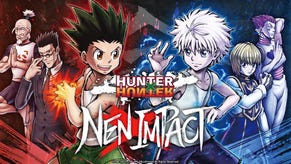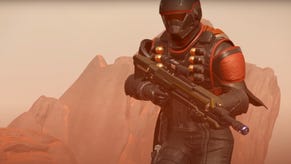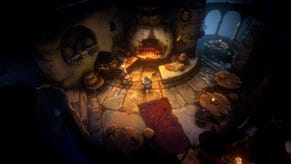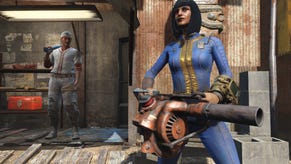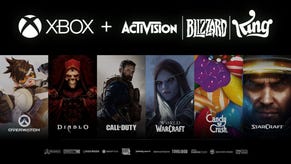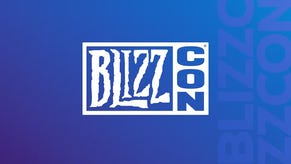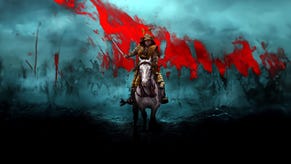THQ sold: buyers include Ubisoft, SEGA, Crytek, Koch, Take-Two
THQ properties were sold today at auction. SEGA picked up Relic; Koch purchased Volition and the Metro franchise; Crytek bought Homefront; Take-Two bought Evolve; and Ubisoft bought THQ Montreal and The South Park game.
Part and parcel
A letter to employees co-issued by THQ's CEO Brian Farrell and president Jason Rubin, courtesy of Kotaku, lists the companies which purchased the firm's IPs at auction.
"The proposed sales of multiple assets is as follows: Sega agreed to purchase Relic, Koch Media agreed to purchase Volition and Metro, Crytek agreed to purchase Homefront, Take 2 agreed purchase Evolve, and Ubisoft agreed to purchase Montreal and South Park," the letter stated.
"We expect these sales to close this week."
According to tweets from DDInvesting, Crytek picked Homefront up for $500,000, Koch nabbed Metro for $5.8 million and Volition for $22.3 million, Ubisoft paid $3.2 million for South Park: The Stick of Truth and $2.5 million for THQ Montreal headed up by former Assassin's Creed chief Patrice Désilets and its 1666 title. A project called Underdog is also in the works at the Canadian studio.
Ubisoft confirmed both its purchases in a press release, making mention that its THQ Montreal acquisition included "a new, yet-to-be announced IP in development".
“This deal adds experienced developers to our internal creative teams at a key moment in the cycle of the video game industry,” Ubisoft Montreal president Yannis Mallat said.
SEGA bought Relic for $26 million and Take-Two bought the unannounced Evolve game from Turtle Rock Studios for $11 million.
Total proceeds of auction came to around $100 million.
There were no bids for Darksiders developer Vigil Games. According to Kotaku's translation, Atsuhi Anaba or Metal Gear Rising: Revengeance and Bayonetta developer Platinum Games tweeted his interest in picking up the Darksiders IP "on the cheap", although it's not clear if this was a serious statement.
Bethesda's parent company ZeniMax Media has put in a backup bid of $26.3 million for Relic in case SEGA's offer doesn't go through. Other backup bidders include Ubisoft for Volition ($5.4 million) and the Metro franchise ($5.175 million). Turtle Rock also submitted a backup bid of $250,000 for its title Evolve.
Speaking with The News-Gazette, an Illinois-based newspaper, Volition general manager Dan Cermak said under Koch Media, the studio will remain in the Champaign, Illinois area. He also said the future looks "very positive" at the moment.
"I haven't had a chance to sit down with [Koch] except for a few moments, and they were very positive," he said. "They love Saints Row and are very happy to own its creator."
As far as THQ's WWE license is concerned, a source close to IGN told the site it will be be sold to Take-Two.
Negotiations for the license took place outside of the auction process, and have yet to be ironed out. Should all go according to play, 2K will be handling development of the wrestling titles; however, until we get confirmation of this, take it as a rumor.
Turtle Rock's Evolve, also known as Metamorphosis, is now in the hands of Take-Two, and is listed on LinkedIn as a "next-gen" title which is also slated for PC, PS3, and Xbox 360. Superannuation dug up the information, along with beat boards for the in-development title.
Some of THQ's legacy properties will be auctioned off at a later date, according to a developer who tried to pick up Homeworld.
Vigil to remain part of Chapter 11 process
Through the firm's financial restructuring and Chapter 11 case, some assets, including the publishing businesses and Vigil, along with other intellectual properties are not included in the sale agreements. These will remain part of the Chapter 11 case and appropriate buyers will be found "if possible."
"We expect that most employees of the entities included in the sale will be offered employment by the new owners," the letter continued. "However, we cannot say what these owners may intend, and there will likely be some positions that will not be needed under the new ownership. You should receive notice this week or early next week if the new owners intend to extend employment to you.
"While the company will cease to exist, we are heartened that the majority of our studios and games will continue under new ownership." - THQ
"If you are an employee of an entity that is not included in the sale, we regret that your position will end. A small number of our headquarters staff will continue to be employed by THQ beyond January 25 to assist with the transition. THQ has sufficient resources to pay these employees for work going forward, and we will be contacting these employees immediately to ensure their continued employment during this transition period.
"We are requesting the ability to offer certain severance pay to minimize disruption for employees of non-included entities as they determine the next steps in their careers."
A meeting is scheduled to take place tomorrow, January 24, and the company letter stated further talks with employees will commence.
The letter went on to say THQ was "proud of what we have accomplished despite today's outcome," and while the company will "cease to exist, we are heartened that the majority of our studios and games will continue under new ownership."
THQ said throughout the ordeal, it was hoping the company would remain intact, "but we expect to hear good news from each of the separate entities that will be operating as part of new organizations."
"I am truly sorry for the THQ employees that have lost their jobs. Please know that I did everything I could and understand your pain," THQ resident Jason Rubin, who took over from Danny Bilson in 2012, said on Twitter.
"Good Luck to Volition, Relic, THQ Montreal, Obsidian, Crytek, TurtleRock, and 4A. Working with you has been an honor. You have my $60," he added, and then:
"I am truly sorry for the employees and fans of Vigil Games. It is a travesty that the team and its potential were not recognized."
"I am truly sorry for the employees and fans of Vigil Games. It is a travesty that the team and its potential were not recognized."
In response to the news that Vigil was not purchased during today's auction, Ben Cureton, lead combat designer at the firm, left a heartfelt message on NeoGAF regarding the slight. He also mention a title Vigil had in the works codenamed "Crawler."
"I've been in this industry for 20 years. Seriously. Two decades. I've been laid off more than once. It sucks every time. But am I sad I don't have a job? Not really... I'm sure I'll get another one eventually," he said. "I'm sad because it won't be THIS job. It won't be at Vigil. That's why I'm sad. The people I waged war with are no longer together.
"Was I proud of the work that I did? Yes. More importantly, was I proud of the work that WE did? Absolutely. I knew, without a shadow of the doubt, that the project we were working on (Codenamed: Crawler) was going to blow people away. In fact, it DID blow people away.
"We did, in TWO months, what many companies haven't done in a year. The pride of knowing that no one was doing anything like us was so satisfying, it kept us coming to work and giving 100% every single day, even through the dark times."
Cureton closed his post by thanking the fans, whose "support means more than you can imagine... you are the reason we made Darksiders 1 and 2... and you are the reason we will continue to make games," he said.
Darksiders 2 lead designer Haydn Dalton also shed some light on Vigil's now-shelved plans, via Twitter:
"There was a shimmer on a slither of hope, that at one point, there'd be a Darksiders III: 4 Player Co-Op; It rode off into the sunset today," he said.
THQ: 1989 - 2013
THQ was founded in 1989, and was known throughout its existence as both a publisher and development house for gaming franchises such as: Saints Row, Warhammer 40,000, Company of Heroes, Darksiders, WWE, and Red Faction among others.
Starting life as the Trinity Acquisition Corporation, in 1990 the firm's business and name were changed to THQ, Inc., which stood for Toy Head Quarters after it acquired Broderbund's video game division. Its first game to hit shelves was Peter Pan and the Pirates in 1991
In 1994 the firm left the toy business to focus on video game production and publishing, and by September 2000 it had acquired Illinois-based developer Volition.
Other acquisitions followed over the next few years, with THQ picking up Blue Tongue Entertainment, Relic Entertainment, Kaos Studios, Vigil Games, and more while expanding its offices into Europe, Australia, Japan, and South Korea.
By 2007, THQ's revenues had hit over $1 billion, and despite its success, growing pains plagued it. Come November 2008 it had closed five of its internal studios, including Paradigm Entertainment.
The firm's revenue continued to decline, and in 2009 the firm announced it would be cutting $220 million in annual costs by 2010. Part of this strategy was letting Heavy Iron Studios and Incinerator Studios become independent firms, and selling Big Huge Games to 38 Studios. However, the firm also picked up left overs from the Midway Games auction, and walked home with the developer's San Diego Studio for $200,000.
After more developer cuts in 2010, THQ introduced the now infamous uDraw Tablet for Wii, a move which was a precursor to even more financial issues for 2011.
During the year, it sold its wireless games division, closed Homefront developer Kaos Studios, dropped the Red Faction IP, and closed Digital Warrington. The firm also announced it would no longer be developing kids titles, a move which saw the closure of Blue Tongue along with Digital Phoenix, killing the MX vs. ATV franchise.
By May 2012, THQ reported a loss of $239.9 million for fiscal year 2012, compared to the $136.1 million it lost the prior year. Last year, the firm also lost its UFC license to EA, and by November it had defaulted on a $50 million loan signed off by Wells Fargo.
By the end of the year, the firm had been delisted by Nasdaq, delayed the release of Company of Heroes 2, South Park: The Stick of Truth, and Metro: Last Light.
THQ filed for bankruptcy in December 2012, revealing at the time that it was in negotiations with a stalking horse purchaser. Five potential buyers were also known to be mulling over the idea of buying at least part of the company, and interested parties included Warner Bros., EA, and Ubisoft, which now owns at least three IPs along with THQ Montreal.





